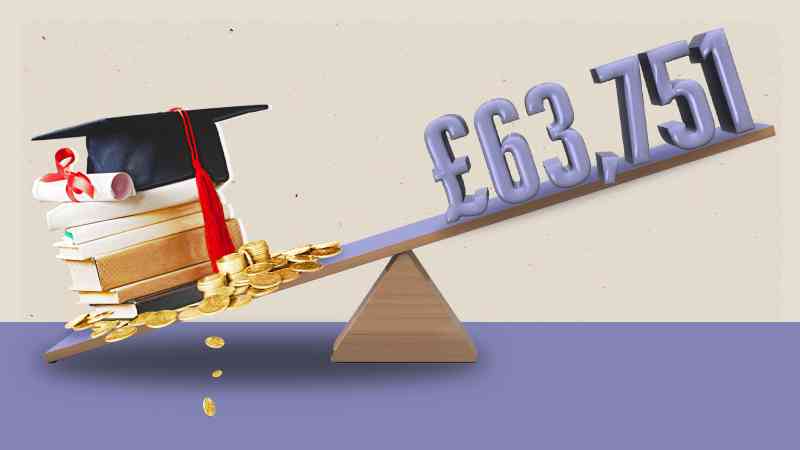When it makes sense to pay back your student loan early
Rising interest rates have caused student debts to spiral. About £8.3 billion of interest was added to loans in 2022, up from £4.6 billion the year before. Some graduates’ monthly repayments are making no inroads into their debt at all, so the amount they owe is actually growing.
“Very few graduates earn enough to make even a slight dent in their loan,” said Ian Futcher from the wealth management firm Quilter.
But those panicking over the scale of a debt should remember that student loans are not like any other type of borrowing. While it might feel as though paying off a loan or making overpayments are financially savvy things to do, they could leave graduates worse off in the long run.
Here’s what you need to know.
Most graduates who started university after September 2012 will have a Plan 2 loan. The interest they pay is linked to the retail price index (RPI) measure of inflation — depending on their salary they can pay up to RPI plus 3 percentage points. On Tuesday the government said that the rate would be 7.3 per cent from September, down from 8 per cent. Anything not repaid on a Plan 2 loan after 30 years is written off.
English students who started university last September have Plan 5 student loans (Plan 3 loans are for postgraduates and Plan 4 loans are for Scottish students). Interest on plan 5 student loans is based on RPI (4.3 per cent from September) and it is 40 years before the debt is written off.
Because the interest rate is so high, most graduates from last year will struggle to even pay the interest on their loans. The average debt of graduates in 2023 was £44,940. At 7.3 per cent interest, their loan would grow £3,281. Students with a Plan 2 loan have to repay 9 per cent of salaryabove £27,295. This means they would need to earn £63,751 before their monthly repayments even cover the £3,281 interest, according to the wealth management company Quilter.
• The lowdown on the new student loan system
Student loan repayments are based on earnings, not the size of the debt. This means that the large amounts of interest racking up do not affect repayments — students pay a set percentage of their salary above a certain threshold, which is why many see the cost of their education as a graduate tax, rather than a loan. A basic-rate taxpayer loses 37p for every £1 they earn above the threshold — 20p as income tax, 8p as national insurance and 9p for a student loan.
Kate Ogden from the Institute for Fiscal Studies, an economic think tank, said: “Student loans should be less worrying to people than other kinds of debt. It does not affect your credit rating; you will not default if you cannot repay it.”
The government estimates that only 27 per cent of full-time undergraduates who started university in 2022 will repay their Plan 2 loans in full. This compares with 35 per cent of students who started studying in 2023 and have Plan 5 loans.
Those with aPlan 5 student loan will repay 9 per cent of their earnings above £25,000 a year when they graduate.
Quilter found that in general graduates would be better off investing any lump sum they had, rather than using it to repay a student debt.
The government expects the average Plan 5 debt of a graduate who started university in September last year to be £43,700.
On a starting salary of £30,000 they would repay a total of about £42,760over 40 years and the rest of their debt (about £72,350) would be written off. (Quilter assumed wages would increase 4 per cent a year, as would the repayment threshold and that the RPI measure of inflation would be 3 per cent.) If that graduate had enough money to immediately clear their debt in full, it would cost them £43,700. If they invested that lump sum instead, they could expect it to be worth £209,805 after 40 years, Quilter said, assuming investments grew 4 per cent a year after fees.
• Student finance 2024: your ultimate guide
Overpaying a chunk of loan would also be unlikely to pay off. In the above example, repaying £10,000 of the loan immediately would mean total repayments of about £52,760 before the rest of the loan was written off, Quilter said.
“On a typical salary, overpaying your student loan debt can leave you worse off in the long term,” Futcher said. “And investing the money could leave you far wealthier overall by the time you retire.”
The maths changes as you start to earn more. Someone with a starting salary of £40,000 would take 28 years and 8 months to repay the average £43,700loan and would repay £70,202 in total, Quilter said.
Paying off £10,000 immediately would mean overall repayments of £58,736 and it would take 22 years and 9 months to clear the loan, Quilter said — £11,466 less than if you made no overpayments.
At this level of earning it would still, however, be better to invest a £43,700 lump sum rather than using it pay off the loan in one go, Quilter said — it could be worth £134,515after the 28 years and 8 months it would take to pay off the loan.
Laura Suter from the investment platform AJ Bell said: “When you graduate you do not know what your salary will be, how interest rates will change or how markets will perform so it is difficult to work out what will leave you better off long term.
“It depends on your priorities. Some people do not want to have a debt hanging over them, while others may want to prioritise using any savings they have to buy a house.”
High earners are less likely to have any of their loan written off, but are likely to pay less interest than someone who never clears their debt.
The higher the salary, the higher the repayments and so the quicker the loan is repaid because there is less time for interest to accrue. Someone on a starting salary of £50,000 and the average debt of £43,700 would repay £58,344 over 18 years and 1 month, Quilter said. Someone on a starting salary of £100,000 could expect to repay £48,214 over 6 years and 4 months.
Ogden said: “If you are a very high earner and so are expecting to have to repay your loan in full then you could consider paying it off up front. But if you are someone who does not think they will ever fully repay their loan, sticking the money in a high-interest savings account can leave you better off. You could try and work out whether your interest rate leaving money at the bank will be higher than the interest rate on your loan.”
The best five-year fixed rate is 4.55 per cent from Al Rayan bank.

When it comes to repaying a student loan, the interest rate is key. It took Arlyne Chinyanganya 11 years to clear her debt, mainly because the interest rate charged after she graduated never went above 1.75 per cent.
“I was lucky. I benefited from a lower interest rate and was able to repay quite quickly,” said Chinyanganya, 34, who is from London.
She graduated from Birmingham City University in 2011 with a degree in business and finance. She borrowed about £21,000 to cover her tuition fees, which were about £3,000 a year, and living costs.
Chinyanganya had a Plan 1 student loan with an interest rate set at RPI or the Bank of England’s base rate, whichever is lower.
• The best student bank accounts in 2024
In 2017 she decided to pay off an extra £100 a month to clear her debt faster. “I was saving for a flat and suddenly my income really mattered. Having money deducted for repayments reduced my salary and affected the amount I could borrow on a mortgage,” she said.
A pay increase in 2020 meant her monthly repayments went up to £400 and by March 2022 she had repaid the lot — £23,400 altogether.
“I wanted to start my own business so I made sure I had no outstanding debts which could hold me back, except my mortgage. I cleared all my credit card debts last year,” said Chinyanganya, who now runs Roots to Froots, a financial coaching business.




Post Comment